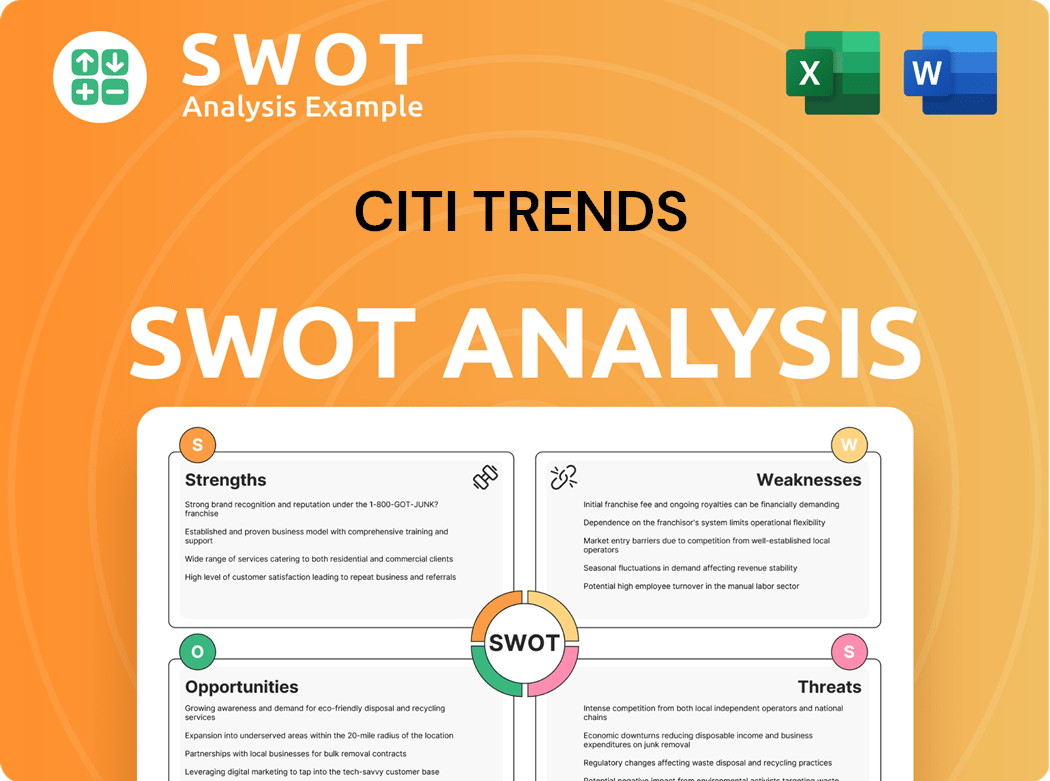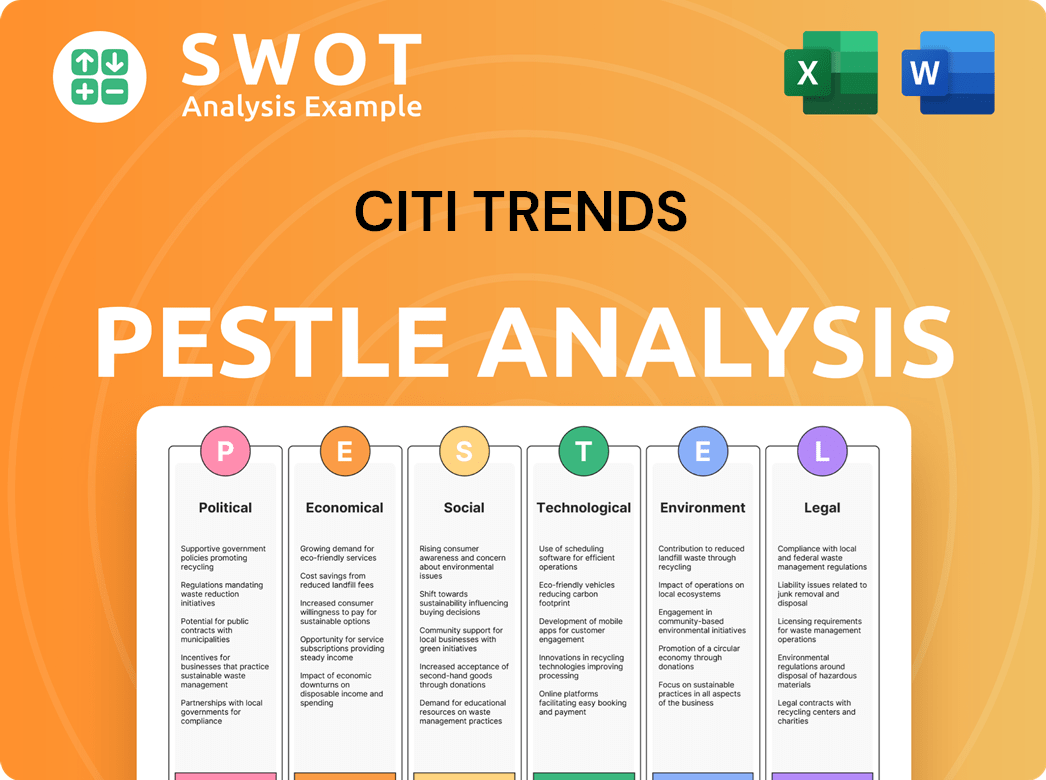Citi Trends Bundle
Who Really Controls Citi Trends?
Unraveling the ownership of Citi Trends is key to understanding its trajectory in the competitive retail landscape. From its roots as a subsidiary to its current status as a publicly traded entity, the company's journey is a testament to its adaptability. This article will explore the intricate web of Citi Trends SWOT Analysis and ownership, revealing the key players shaping its future.

Understanding the dynamics of Citi Trends ownership offers valuable insights for investors and stakeholders. The Citi Trends company has a fascinating history, evolving from its origins to become a significant player in the retail sector. Knowing who owns Citi Trends gives a clear view of its strategic direction, especially when considering its financial performance and the influence of its leadership team.
Who Founded Citi Trends?
Understanding the ownership structure of the Citi Trends company involves tracing its evolution from its origins to its current status. While the company as it is known today was established in 2001, its roots stretch back to 1946 with Savannah Wholesale Co., a subsidiary of Allied Department Stores. This journey has seen significant shifts in ownership, especially with the transition to a publicly traded company.
In 1999, a private equity firm acquired the company, which then operated 85 stores. This acquisition was a pivotal moment, leading to a strategic focus on the urban market to enhance financial performance and operational efficiency. This strategic shift set the stage for the company's future growth and its eventual public offering.
The initial public offering (IPO) on May 18, 2005, marked a significant turning point in the company's ownership. During the IPO, a total of 3,850,000 shares of common stock were offered at $14.00 per share. Of these, 2,700,000 shares were offered by the company itself, and 1,150,000 shares were offered by certain selling stockholders. CIBC World Markets managed the underwriting syndicate for the IPO.
The early ownership of Citi Trends was significantly influenced by the 1999 acquisition by a private equity firm and the subsequent IPO in 2005. The IPO transitioned the company from private ownership to a publicly traded entity. The specific details of individual founders' equity splits or precise shareholdings at the company's inception in 2001 are not explicitly detailed in publicly available information.
- The IPO in 2005 offered shares at $14.00 each.
- 2,700,000 shares were offered by Citi Trends, Inc. during the IPO.
- The company's focus shifted to the urban market after the 1999 acquisition.
- CIBC World Markets was the lead manager for the IPO underwriting.
Citi Trends SWOT Analysis
- Complete SWOT Breakdown
- Fully Customizable
- Editable in Excel & Word
- Professional Formatting
- Investor-Ready Format

How Has Citi Trends’s Ownership Changed Over Time?
The journey of Citi Trends from its inception to its current ownership structure is marked by key transitions. The company, initially operating privately, underwent a significant transformation when it became a publicly traded entity. This shift occurred on May 18, 2005, with its initial public offering (IPO), which allowed the company to raise capital from a broader investor base and increased public scrutiny.
The move to the Nasdaq National Market under the ticker symbol 'CTRN' was a pivotal moment, altering the company's governance and opening it up to a more diverse group of shareholders. This transition from private to public ownership has shaped the company's strategic direction and financial reporting practices, making it subject to rigorous SEC regulations and increased investor expectations.
| Ownership Category | Percentage of Shares (April 2025) | Notes |
|---|---|---|
| Institutional Investors | 93.42% | Reflects confidence from large financial entities. |
| Insider Ownership | 6.92% | Aligns leadership interests with shareholder value. |
| Mutual Funds | 36.86% | A decrease from 38.15% in previous months. |
As of April 2025, the ownership of Citi Trends is predominantly held by institutional investors. Key institutional shareholders include Nuveen, LLC, Fund 1 Investments, LLC, and BlackRock, Inc. Fund 1 Investments, LLC, holds a significant stake, owning 31.09% of the company's shares. Kenneth Duane Seipel, the CEO and Chairman of the Board, is a notable insider, directly owning 8.39% of the company's shares. Vanguard holds 4.15%, and DFA Investment Dimensions Group Inc. holds 3.75%.
The majority of Citi Trends is owned by institutional investors, indicating strong financial backing. Insider ownership, led by the CEO, aligns leadership interests with the company's success.
- Institutional investors hold a significant portion of the shares.
- Insider ownership ensures alignment between leadership and shareholder value.
- The IPO in 2005 was a pivotal moment for the company.
- The company's financial reporting adheres to SEC regulations.
Citi Trends PESTLE Analysis
- Covers All 6 PESTLE Categories
- No Research Needed – Save Hours of Work
- Built by Experts, Trusted by Consultants
- Instant Download, Ready to Use
- 100% Editable, Fully Customizable

Who Sits on Citi Trends’s Board?
As of April 2, 2025, the leadership structure at Citi Trends includes Kenneth (Ken) Seipel as both the Chief Executive Officer and Chairman of the Board. David Heath serves as the Lead Independent Director, also effective April 2, 2025. The Board of Directors has seen changes, particularly with the appointment of new independent directors in connection with agreements with major shareholders.
The Board of Directors of the Citi Trends company as of June 2025 includes Wesley Calvert, Pamela Edwards, Margaret Jenkins, Michael Kvitko, Cara Sabin, Chaoyang Liu, and Peter Sachse. Wesley Calvert chairs the Finance Committee, and Pamela Edwards chairs the Audit Committee. Jonathan Duskin retired from the board on April 2, 2025. These appointments and changes reflect the ongoing evolution of the company's governance structure.
| Board Member | Title | Committee |
|---|---|---|
| Kenneth (Ken) Seipel | Chairman of the Board, CEO | N/A |
| David Heath | Lead Independent Director | N/A |
| Wesley Calvert | Independent Director | Finance Committee (Chair) |
| Pamela Edwards | Independent Director | Audit Committee (Chair) |
| Margaret Jenkins | Director | N/A |
| Michael Kvitko | Director | N/A |
| Cara Sabin | Director | N/A |
| Chaoyang Liu | Director | N/A |
| Peter Sachse | Director | N/A |
The voting structure for Citi Trends follows the standard one-share-one-vote model common in publicly traded companies. Stockholders as of the record date of April 7, 2025, were eligible to vote at the annual meeting scheduled for June 5, 2025. At the 2024 annual meeting held on June 20, 2024, stockholders elected eight director nominees and approved an amendment to the 2021 Incentive Plan to increase authorized shares. These actions highlight the shareholders' influence on the company's direction and governance.
The Board of Directors includes a mix of independent directors and representatives of major shareholders.
- Ken Seipel is the CEO and Chairman of the Board.
- David Heath serves as Lead Independent Director.
- Voting rights are aligned with a one-share-one-vote structure.
- Shareholders have a direct impact on the company's direction through voting.
Citi Trends Business Model Canvas
- Complete 9-Block Business Model Canvas
- Effortlessly Communicate Your Business Strategy
- Investor-Ready BMC Format
- 100% Editable and Customizable
- Clear and Structured Layout

What Recent Changes Have Shaped Citi Trends’s Ownership Landscape?
Over the past few years, significant developments have reshaped the ownership landscape of the Citi Trends company. A key indicator of this is the company's share repurchase program. In the fourth quarter of fiscal 2024, ending February 1, 2025, Citi Trends repurchased 145,238 shares for $3.8 million. This continued into the first quarter of fiscal 2025, ending May 3, 2025, with an additional 250,555 shares repurchased for $6.2 million. Overall, since restarting the program in Q4 2024, the company has spent $10.0 million to repurchase 395,793 shares, with $40.0 million remaining under the program. This program indicates a commitment to returning capital to shareholders.
Leadership changes have also influenced the ownership profile. Ken Seipel, previously the Chief Executive Officer, was elected Chairman of the Board effective April 2, 2025. Simultaneously, Peter Sachse and Jonathan Duskin retired from the board on the same date. The company also welcomed two new independent directors, Wesley Calvert and Pamela Edwards, to the Board, as part of an amended cooperation agreement with Fund 1 Investments, LLC.
| Ownership Category | Percentage (April 2025) | Change |
|---|---|---|
| Institutional Investors | 93.42% | Increased |
| Mutual Funds | 36.86% | Decreased |
| Insider Ownership | 6.92% | - |
Industry trends show increased institutional ownership. As of April 2025, institutional investors held 93.42% of Citi Trends' shares. Insider ownership stood at 6.92%. Recent insider trading activity in the past six months includes sales by Jonathan Duskin and Katrina George. Hedge funds have shown mixed activity, with some increasing and others decreasing their positions in Q1 2025. Looking ahead, Citi Trends anticipates low to mid-single-digit comparable store sales growth for fiscal 2025. This growth, combined with ongoing share repurchases, underscores a focus on enhancing financial performance and shareholder value.
Citi Trends has been actively repurchasing shares, demonstrating a commitment to returning value to shareholders. The company has repurchased a significant number of shares in fiscal 2024 and 2025, indicating confidence in its financial stability and future prospects.
The company has experienced leadership changes, including the election of a new Chairman and the addition of new independent directors. These changes may influence the company's strategic direction and operational focus.
Institutional investors hold a substantial portion of Citi Trends' shares, reflecting confidence in the company's performance. Mutual fund holdings have slightly decreased, while overall institutional ownership remains high.
Citi Trends anticipates growth in comparable store sales for fiscal 2025 and plans to remodel existing stores. These initiatives, along with share repurchases, suggest a focus on improving financial performance and shareholder value.
Citi Trends Porter's Five Forces Analysis
- Covers All 5 Competitive Forces in Detail
- Structured for Consultants, Students, and Founders
- 100% Editable in Microsoft Word & Excel
- Instant Digital Download – Use Immediately
- Compatible with Mac & PC – Fully Unlocked

Related Blogs
- What are Mission Vision & Core Values of Citi Trends Company?
- What is Competitive Landscape of Citi Trends Company?
- What is Growth Strategy and Future Prospects of Citi Trends Company?
- How Does Citi Trends Company Work?
- What is Sales and Marketing Strategy of Citi Trends Company?
- What is Brief History of Citi Trends Company?
- What is Customer Demographics and Target Market of Citi Trends Company?
Disclaimer
All information, articles, and product details provided on this website are for general informational and educational purposes only. We do not claim any ownership over, nor do we intend to infringe upon, any trademarks, copyrights, logos, brand names, or other intellectual property mentioned or depicted on this site. Such intellectual property remains the property of its respective owners, and any references here are made solely for identification or informational purposes, without implying any affiliation, endorsement, or partnership.
We make no representations or warranties, express or implied, regarding the accuracy, completeness, or suitability of any content or products presented. Nothing on this website should be construed as legal, tax, investment, financial, medical, or other professional advice. In addition, no part of this site—including articles or product references—constitutes a solicitation, recommendation, endorsement, advertisement, or offer to buy or sell any securities, franchises, or other financial instruments, particularly in jurisdictions where such activity would be unlawful.
All content is of a general nature and may not address the specific circumstances of any individual or entity. It is not a substitute for professional advice or services. Any actions you take based on the information provided here are strictly at your own risk. You accept full responsibility for any decisions or outcomes arising from your use of this website and agree to release us from any liability in connection with your use of, or reliance upon, the content or products found herein.